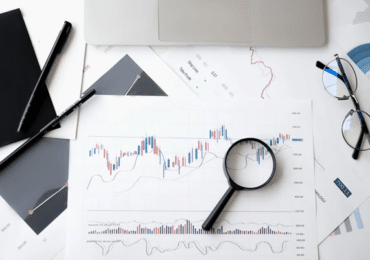In today’s fast-paced financial world, traders and investors must be quick on their feet and able to quickly adjust to new situations. The unstoppable advance of technology has completely disrupted conventional trading models. New, technology-driven trading tactics are changing the very nature of the market as the worlds of technology and finance collide. This essay sets out on an in-depth investigation, diving into the factors that have made these high-tech trading methods not only the preferred option but a need. They may not only make it through the complex web of financial markets but thrive there as a result of the instruments at their disposal.
Converging high-tech innovations and new technologies reshape the commodities market in today’s fast-paced trading environment. To increase efficiency, traditional commodities markets are experiencing a digital makeover. Focusing on the crucial role played by technologies, let’s investigate the fascinating developments at the intersection of technology and commodities. These developments are not only altering the commodities market but also giving companies new and exciting prospects. Here is why technology-driven strategies lead to informed trading.

Trading in Commodities Is Made Easier by AI
Algorithms powered by artificial intelligence (AI) are revolutionizing the commodities trading industry. Modern predictive analytics, algorithmic trading skills, and effective risk management solutions are all at the fingertips of traders thanks to these resources. Algorithms trained with machine learning can sift through mountains of data, looking for trends and delivering quick, actionable insights to traders and analysts. Artificial intelligence (AI) powered tools and platforms, such as the best day trading platforms in the UK, have given retail traders access to previously unavailable resources, such as advanced predictive analytics, algorithmic trading skills, and strong risk management solutions. Businesses may evaluate market trends, account for pricing changes, and optimize their supply chains with the aid of AI-powered forecasting models.
Blockchain Will Disrupt the Commodities Industry
The commodities market is buzzing about blockchain because of the increased transparency, traceability, and security it provides across the supply chain. Distributed ledgers and smart contracts made possible by blockchain technology increase productivity in areas like inventory management, trade finance, and provenance verification while simultaneously decreasing the possibility of fraudulent conduct. By increasing transparency and streamlining processes, blockchain technology is transforming the commodities market. This has several potential applications, including verifying the legitimacy of suppliers and streamlining the trading process.
The Rise of Sustainable Investing
The increasing importance of sustainability is one example of the ways in which technology has altered the business environment. Traders and investors may evaluate not just the financial performance of assets but also their environmental, social, and governance (ESG) issues, thanks to the availability of huge volumes of data and sophisticated analytics. As more and more investors use digital tools to assess their portfolios’ global effects, sustainable investing has become more popular.
With the help of these tech-enabled resources, investors may make better choices that are consistent with their moral convictions and commitment to long-term sustainability. Investors are paying more attention to businesses with outstanding ESG performance, leading to a change in the market toward environmentally responsible investments. Sustainable investing is predicted to play a more critical role in influencing trading strategies and portfolio management as technology continues to improve the assessment and monitoring of ESG criteria.
Data Analytics Is a Gold Mine of Market Information
Commodity market players may greatly improve their ability to make informed decisions and gain a competitive edge by making use of data analytics. Commodity traders may get an advantage in the market by using these cutting-edge data analytics methods to gain insight into market trends, historical price patterns, and anticipated demand and supply dynamics. Traders may improve their data-driven pricing strategies, streamline their procurement operations, and reinforce their risk management choices by successfully mixing structured and unstructured data sources. This information-driven strategy not only improves productivity but also sets them up for long-term success in the dynamic commodities market.

Market Flexibility and Expansion Potential
Technology-driven tactics are crucial in the modern financial environment because of their flexibility and scalability, which allow traders to respond quickly to shifting market circumstances. These methods not only allow for adaptability but also for the fine-tuning and modification of plans in light of a changing market. Think about the effects of, say, a sudden shift in market sentiment or a breaking news event that affects a certain kind of asset. Trading algorithms driven by artificial intelligence can automatically adjust their settings to account for shifting market conditions. The versatility of technology-driven strategies is a game-changer for all types of traders, from amateur investors looking for bitcoin market possibilities to institutional managers juggling equities, commodities, and currencies. Because of this flexibility, portfolio management may be conducted effectively across a broad variety of investment routes and applied to a large number of asset classes and markets.
Using Technology Encourages Best Investment Decisions
Today’s financial markets need, rather than encourage, the use of technology in trading tactics. Traders may boost performance, minimize expenses, and increase execution capabilities with the use of cutting-edge data analytics, digitalization, and automation. Customer satisfaction rises as a result of the availability of user-friendly interfaces, individualized suggestions, and real-time access to portfolio information provided by technological solutions. Traders may save time, effort, and resources by using technology to streamline their compliance with regulatory requirements, computerize their reporting procedures, and safeguard their data.
As a result of the meeting point of technology and commerce, the commodities market is undergoing a seismic shift. The purchasing, selling, and transporting of goods is evolving due to technological breakthroughs like blockchain’s improved supply chain transparency, and AI’s analytical capability. Companies that are willing to adapt to new technology have an edge in a market that is always changing. The revolutionary influence of technology on the commodities sector presents a hopeful horizon as we approach a new age characterized by efficiency, sustainability, and profitability. Success in today’s volatile market will require the commodities industry to enthusiastically embrace these revolutionary changes. Because of this, we may look forward to a day when technology-driven methods result in not just knowledgeable trading but also robust, competitive, and fruitful firms in the dynamic commodities market.

